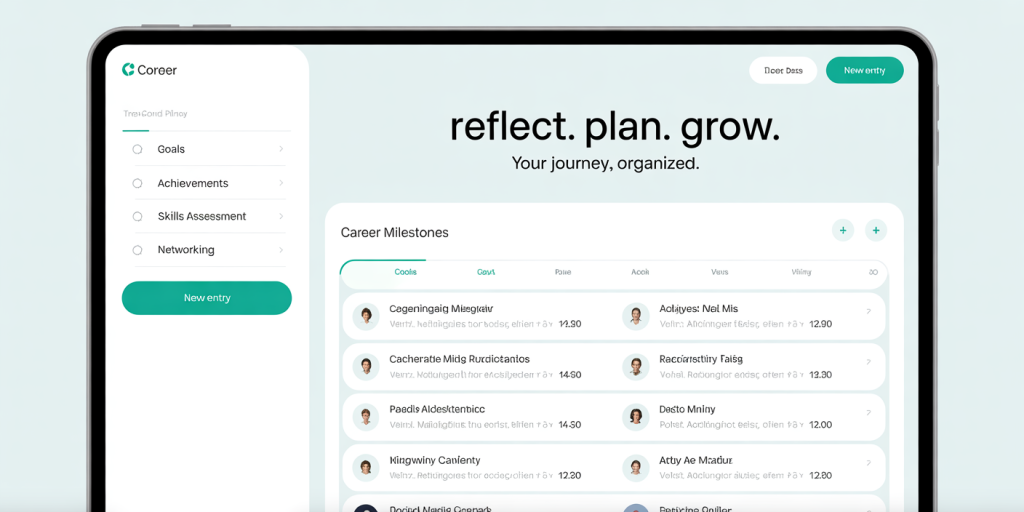In today’s fast-paced professional world, maintaining a keen awareness of your career progression is more critical than ever. A career journal—a dedicated record of your professional experiences, reflections, challenges, and achievements—can play a pivotal role in guiding career growth, boosting confidence, and refining goals. While many professionals rely on memory or digital reminders, a systematic journaling practice provides a more comprehensive and actionable approach to career development.
Studies show that keeping a journal can improve self-awareness, creativity, and problem-solving skills, traits highly valued in the workplace (Pennebaker & Seagal, 1999). With many employees changing jobs every 3.5 years on average (U.S. Bureau of Labor Statistics, 2023), the ability to track and reflect on one’s career journey ensures readiness for new opportunities and informed decision-making.
The Significance of a Career Journal for Professional Growth
Staying competitive in today’s job market requires more than just completing tasks; it involves ongoing learning and self-assessment. A career journal serves as a personal database of experiences, allowing professionals to revisit past projects, challenges overcome, and skills developed. This documentation can be invaluable during performance reviews, interviews, and career planning.
For example, Anita, a mid-level marketing manager, struggled to articulate her accomplishments during annual reviews until she began maintaining a career journal. By logging achievements and lessons learned monthly, she could confidently present evidence of her impact, which led to a promotion within a year. This practice fosters a growth mindset, encouraging deliberate reflections and setting actionable objectives rather than passive progression.
Moreover, journaling career milestones helps track skill acquisition and gaps, aligning professional development with industry trends. According to LinkedIn’s Workplace Learning Report (2023), 74% of employees want help identifying skills to learn for their next role, proving the demand for structured self-assessment tools like a career journal.
Enhancing Self-Reflection and Emotional Intelligence
Emotional intelligence (EI) — the ability to understand and manage one’s emotions and relationships — is a critical leadership skill linked to career success (Goleman, 1998). Regularly recording your emotional responses to workplace events through a career journal enhances EI by promoting self-awareness and empathy.
Consider a software developer, Raj, who faced frequent project setbacks causing frustration and communication breakdowns with colleagues. By journaling his feelings after each sprint, Raj identified recurring stress triggers and developed coping strategies. Over time, his improved emotional regulation translated to better team collaboration and more constructive feedback exchanges.

Furthermore, journaling encourages reflection on conflicts and resolutions, offering insights into personal behavioral patterns. This iterative learning is transformative, particularly in managerial roles where understanding diverse perspectives is key. Employers increasingly prioritize candidates who demonstrate strong EI; journaling thus serves as a practical method for developing this sought-after attribute.
Comparative Table: Emotional Intelligence Before and After Career Journaling
| Aspect | Before Career Journaling | After Career Journaling |
|---|---|---|
| Self-awareness | Limited recognition of triggers | Identifies emotional patterns |
| Stress management | Frequent reactive episodes | Proactive coping strategies |
| Communication | Defensive or withdrawn | Constructive and empathetic |
| Conflict resolution | Avoidance or escalation | Reflective and solution-focused |
This table illustrates how journaling can systematically enhance emotional and interpersonal competencies.
Structuring Your Career Journal for Maximum Benefit
Not all career journals are created equal; success depends largely on how you format and use the journal. Here are essential components and formats that can optimize your journaling practice.
Start with chronological entries detailing daily or weekly experiences. Include descriptions of projects, interactions, challenges, and successes. Then incorporate sections for goal setting—short-term objectives and long-term career aspirations.
Evaluating skills and personal growth areas is also critical. For instance, after completing a leadership training course, note key takeaways, areas for improvement, and plans to apply learnings on the job. Tracking certifications achieved or courses completed enriches the journal’s utility.
Many professionals adopt digital tools such as Evernote, OneNote, or dedicated career apps that allow multimedia input and easy search functions. This digital flexibility supports tagging entries by theme (e.g., “leadership,” “client feedback”) and generating monthly summaries, which assist in performance evaluations and interviews.
Example Format: Career Journal Template
| Section | Purpose | Sample Entries |
|---|---|---|
| Daily/Weekly Log | Records activities & reflections | “Presented Q2 report; received positive feedback; struggled with time management” |
| Skills Assessment | Identifies growth & gaps | “Improved data analysis skills; need to work on public speaking” |
| Goals & Objectives | Sets and reviews targets | “Short-term: attend conflict resolution workshop; Long-term: team lead position” |
| Achievements | Celebrates milestones | “Completed project ahead of deadline; recognized by management” |
| Lessons Learned | Documents insights & improvements | “Better preparation needed for client calls to avoid miscommunications” |
Using such a structured approach transforms vague recollection into purposeful documentation, making the journal a living tool rather than a forgotten diary.
Leveraging a Career Journal During Job Searches and Networking
Job hunting and networking can be overwhelming without clear records of previous roles, skills, and contacts. A career journal functions as a centralized repository that streams lines these processes.
When preparing resumes or cover letters, referring to your journal guarantees specificity and richness in descriptions. Recruiters tend to favor candidates who provide quantifiable achievements rather than generic claims. For example, instead of saying “managed a team,” you can write “led a team of 10 software engineers, improving project delivery speed by 20%.”
Networking also benefits from journaling. Documenting interactions with contacts, follow-ups, and outcomes ensures you nurture professional relationships effectively. Case in point: Sophia, a sales consultant, credited her career growth to diligently noting networking events, leads, and conversation highlights, which she reviewed before meetings to maintain personalized connections.
Comparative Table: Benefits of Using a Career Journal vs Not Using One in Job Search
| Aspect | With Career Journal | Without Career Journal |
|---|---|---|
| Resume creation | Specific, evidence-based entries | Vague and generalized claims |
| Interview prep | Focused on achievements & examples | Struggles to recall details |
| Networking follow-up | Organized contacts and notes | Missed connections & forgotten details |
| Confidence level | Elevated through preparation | Anxiety due to lack of data |
This comparison highlights how maintaining a career journal gives job seekers a distinct competitive advantage.

Overcoming Common Challenges in Keeping a Career Journal
While the benefits are clear, starting and maintaining a career journal can pose challenges such as procrastination, privacy concerns, or lack of time. Addressing these proactively increases the likelihood of long-term adherence.
To combat procrastination, allocate a fixed, manageable time slot for journaling—perhaps 10-15 minutes at the end of the day or week. Treat it like a professional commitment rather than a burdensome personal task. Setting reminders and integrating journaling with other productivity habits (like planning tomorrow’s work) can make it part of your routine.
Regarding privacy, digitally stored journals should be password protected or encrypted, especially when sensitive information about your employer or colleagues is involved. Alternatively, use secure apps designed for confidentiality or maintain a physical journal stored safely.
Finally, keeping entries concise but meaningful avoids journal fatigue. Bullet points or brief paragraphs summarizing key events can be more effective than lengthy narratives.
Looking Ahead: The Evolving Role of Career Journals in the Digital Age
As artificial intelligence and digital platforms continue to transform the workplace, career journaling practices are likely to evolve. Emerging tools such as AI-powered career coaches can analyze journal entries to provide personalized development recommendations, identify skill gaps, and suggest learning pathways.
Furthermore, integration with performance management systems could automate the extraction of meaningful insights from your entries, providing richer feedback during appraisals. Virtual reality (VR) environments may also support immersive journaling experiences, allowing professionals to simulate scenarios and record reflections in real-time.
The future also hints at increased emphasis on mental health and work-life balance documentation within career journals, supporting holistic professional well-being. As remote and hybrid work models expand, journaling can bridge the disconnect by promoting continuous self-engagement and transparent communication with supervisors.
In conclusion, keeping a career journal is no longer a luxury but an essential practice for proactive career management. The blend of strategic reflection, emotional intelligence development, goal tracking, and documentation offers measurable advantages in personal and professional growth. By adopting effective journaling methods today, you not only enhance your current career trajectory but also prepare for a future where adaptive, self-aware professionals thrive in dynamic work environments.


Deixe um comentário